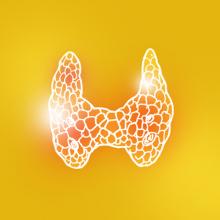What’s Your Thyroid Telling You?

A version of this post was originally published on the blog of Dr. Frank Lipman.
* * *
It starts out “innocently” enough. You’re feeling fatigued, but you chalk it up to the demands of life. You’re feeling a little down, but you tell yourself that we can all get down when we’re tired.
Then, seemingly out of nowhere, there’s a spare tire around your middle. You can’t poop. You get chilled more easily. And you’re shedding hair.
Maybe your doctor glibly explains that it’s “part of getting older.” But taken together, this cluster of symptoms can mean that your thyroid is under-functioning (hypothyroidism).
The nice thing (if there is a nice thing about hypothyroidism) is that we don’t need to view these symptoms as silos needing separate treatment (like a laxative, an antidepressant, or Rogaine—none of which I advocate for).
Manage the hypothyroidism naturally, and you can see improvement across the board. I’ve been helping clients reverse hypothyroidism for many years and I like to call this smart approach “catching multiple butterflies with one net.”
What is the Thyroid?
The thyroid is a butterfly-shaped gland in the neck and it’s the boss of our endocrine (hormonal) system. It’s nicknamed “the master gland of metabolism” and I’ve often referred to it as the spoon that stirs our hormonal soup.
The thyroid’s job is to absorb iodine and combine it with the amino acid tyrosine. It then converts this combination into T3 and T4. Every cell has receptors for these thyroid hormones and given that T4 is mostly inactive and T3 is “the big daddy,” helping the body benefit from what our thyroid should be doing for us, it’s critical to understand what can thwart this conversion process.
Thyroid hormones aren’t only responsible for metabolism and energy, but also directly affect the brain, gastrointestinal tract, reproductive system, and cardiovascular system and influence bone metabolism, red blood cell metabolism, gallbladder and liver function, steroid hormone production, glucose metabolism, and body temperature regulation.
Common hypothyroid symptoms include:
- Weight gain/weight loss resistance
- Fatigue
- Depression
- Hair loss, including outer third of eyebrows
- Constipation
- Dry skin
- Dry, wiry hair (“thyroid hair”)
- Difficulty thermo-regulating (feeling cold)
- Brain fog
- Poor reflexes
Lesser known (but no less annoying) symptoms include:
- Pronounced morning fatigue
- Digestive issues
- Irregular menstrual cycles
- Edema/fluid retention (mostly around eyes/face)
- Frequent infections
- Other hormonal imbalances (primarily adrenal and reproductive)
- Low libido
- Being stiff and achy upon waking (this can also be related to stagnant lymph)
- Dry mouth
- Gravely voice
- Anxiety
- Premature greying
- Infertility, including miscarriages
- Severe PMS
- Headaches
- High cholesterol
What Causes Hypothyroidism?
Hypothyroidism in the form of Hashimoto’s (autoimmune hypothyroidism) is not only the most common form of thyroid dysfunction (representing an estimated 90-plus percent of hypothyroid cases), but Hashimoto’s is also the most common autoimmune disorder.
Many doctors claim that hypothyroidism is caused by iodine deficiency, but this tells a small part of the story. Other causes of hypothyroidism (including the autoimmune component) include exposure to environmental toxins (heavy metals, pesticides, fluoride, bromine, etc.), unrelenting stress, adrenal dysfunction, systemic inflammation, and nutritional deficiencies.
Nutrition for the Thyroid
Whether you’re on thyroid hormone replacement or not, addressing your diet is critical for managing hypothyroidism and Hashimoto’s. Eating minimally processed foods with naturally occurring vitamins, minerals, and phytonutrients is one of the best ways to support the thyroid—and the immune system.
The standard American diet (SAD) that consists of refined sugars, genetically modified foods, artificial additives and sweeteners, toxic oils, and antibiotic and hormone-laden foods cause oxidative stress, which affects how our cells communicate. When you consider that every cell in the body has receptors for thyroid hormone, it’s easy to understand how a nutrient-deficient diet can interrupt this cellular communication.
Several years ago, in preparation for the publication of my bestselling Essential Thyroid Cookbook(September 2017), I spent many weeks going cross-eyed, geeking out on the most thyroid- and immune-supportive nutrition and then identifying foods high in those nutrients.
This rigorous research and sophisticated ranking system became the “nutritional springboard” for our Essential Thyroid Cookbook.
This first-of-its-kind resource will leave no doubt in your mind that the recipes, expertly crafted by culinary nutritionist, Lisa Markley, MS, RDN, are uniquely beneficial to your thyroid and immune system. It’s truly a thyroid health book within a cookbook, as the first third is educational and the appendixes very enlightening.
It was published in 2017 and is still going strong—and will support you for a lifetime of peak thyroid function no matter where you are on your wellness journey.
“Lisa and Jill have created one of the most amazing food education and recipe books I’ve ever seen.” — Susan Blum, MD, MPH, author of The Immune System Recovery Plan
“If you struggle with hypothyroidism, this is your ultimate cookbook. These 100-plus recipes will empower you to live each and every day with joy, energy, and balance. The authors are superstar nutrition professionals; savor their insights and let their wisdom nourish you!” — Gregory Plotnikoff, MD

Comments
I am vegetarian, eating eggs,
I am vegetarian, eating eggs, cheese and some fish. Is this program workable with these restrictions? When I Eat meat, my blood counts go so low that I require blood transfusions. Thank you for your help
Hi Cappy, yes, it's workable.
Hi Cappy, yes, it's workable.
Add comment